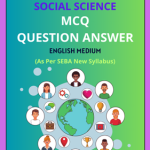SEBA Class 6 Social Science MCQ Chapter 22 Democracy and its Principles Solutions in English Medium, Class 6 Social Science Multiple Choice Question Answer to each chapter is provided in the list so that you can easily browse throughout different chapters SEBA Class 6 Social Science MCQ Chapter 22 Democracy and its Principles Question Answer and select need one.
SEBA Class 6 Social Science MCQ Chapter 22 Democracy and its Principles
Also, you can read the SCERT book online in these sections SEBA Class 6 Social Science Objective Type Solutions by Expert Teachers as per SCERT (CBSE) Book guidelines. These solutions are part of SCERT All Subject Solutions. Here we have given Assam SEBA Class 6 Social Science MCQ Solutions for All Subject, You can practice these here.
Democracy and its Principles
Chapter – 22
| MCQ |
1. What is democracy?
(a) Rule by a single person.
(b) Rule by the people.
(c) Rule by the wealthy.
(d) Rule by a king.
Answer: (b) Rule by the people.
2. Which of the following is a principle of democracy?
(a) Authoritarianism.
(b) Totalitarianism.
(c) Equal representation.
(d) Monarchy.
Answer: (c) Equal representation.
3. Who is considered the father of democracy?
(a) Aristotle.
(b) Socrates.
(c) Pericles.
(d) Plato.
Answer: (c) Pericles.
4. Which document is fundamental to the functioning of a democracy?
(a) The Constitution.
(b) The Bible.
(c) The Quran.
(d) The Vedas.
Answer: (a) The Constitution.
5. What is universal adult franchise?
(a) Only men can vote.
(b) Only women can vote.
(c) All adults have the right to vote.
(d) Only property owners can vote.
Answer: (c) All adults have the right to vote.
6. Which country is known as the largest democracy in the world?
(a) China.
(b) United States.
(c) India.
(d) Brazil.
Answer: (c) India.
7. In a democracy, the government is elected by:
(a) A small group of elites.
(b) All eligible voters.
(c) The military.
(d) Religious leaders.
Answer: (b) All eligible voters.
8. What does the term ‘secular’ mean in a democratic context?
(a) The state is religious.
(b) The state is anti-religious.
(c) The state has no official religion.
(d) The state supports only one religion.
Answer: (c) The state has no official religion.
9. Which right is essential for the practice of democracy?
(a) Right to property.
(b) Right to education.
(c) Right to vote.
(d) Right to work.
Answer: (c) Right to vote.
10. In a democratic system, who has the ultimate authority?
(a) The President.
(b) The Prime Minister.
(c) The People.
(d) The Judiciary.
Answer: (c) The People.
11. What does ‘rule of law’ imply?
(a) Laws are applied only to the poor.
(b) Laws are applied equally to all citizens.
(c) Laws are made by the king.
(d) Laws are made by the military.
Answer: (b) Laws are applied equally to all citizens.
12. Which institution is crucial for safeguarding democracy?
(a) Military.
(b) Judiciary.
(c) Corporate sector.
(d) Religious institutions.
Answer: (b) Judiciary.
13. What is a ‘referendum’?
(a) A general election.
(b) A direct vote on a specific issue.
(c) A speech by the President.
(d) A military takeover.
Answer: (b) A direct vote on a specific issue.
14. What is the role of opposition parties in a democracy?
(a) To support the government.
(b) To criticise and check the government.
(c) To control the military.
(d) To make laws.
Answer: (b) To criticise and check the government
15. Which is an essential feature of democracy?
(a) Hereditary rule.
(b) Free and fair elections.
(c) Rule by the wealthy.
(d) Dictatorship.
Answer: (b) Free and fair elections.




